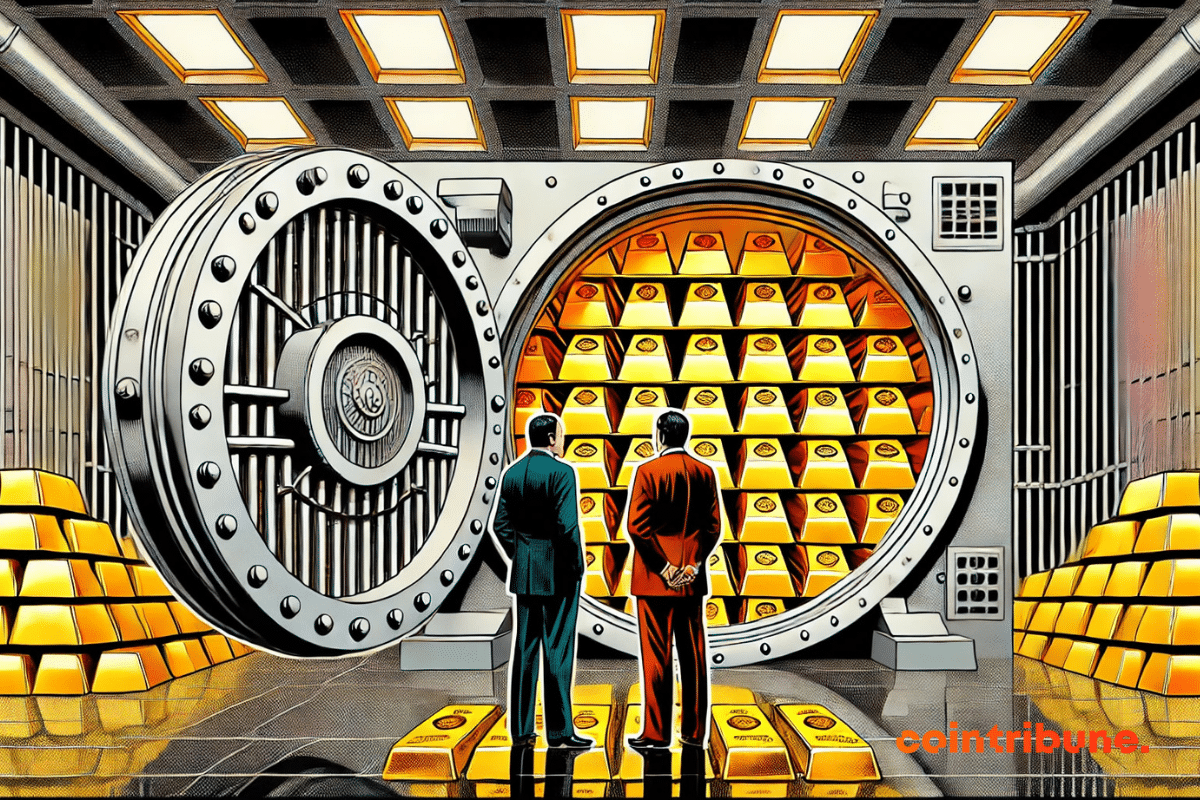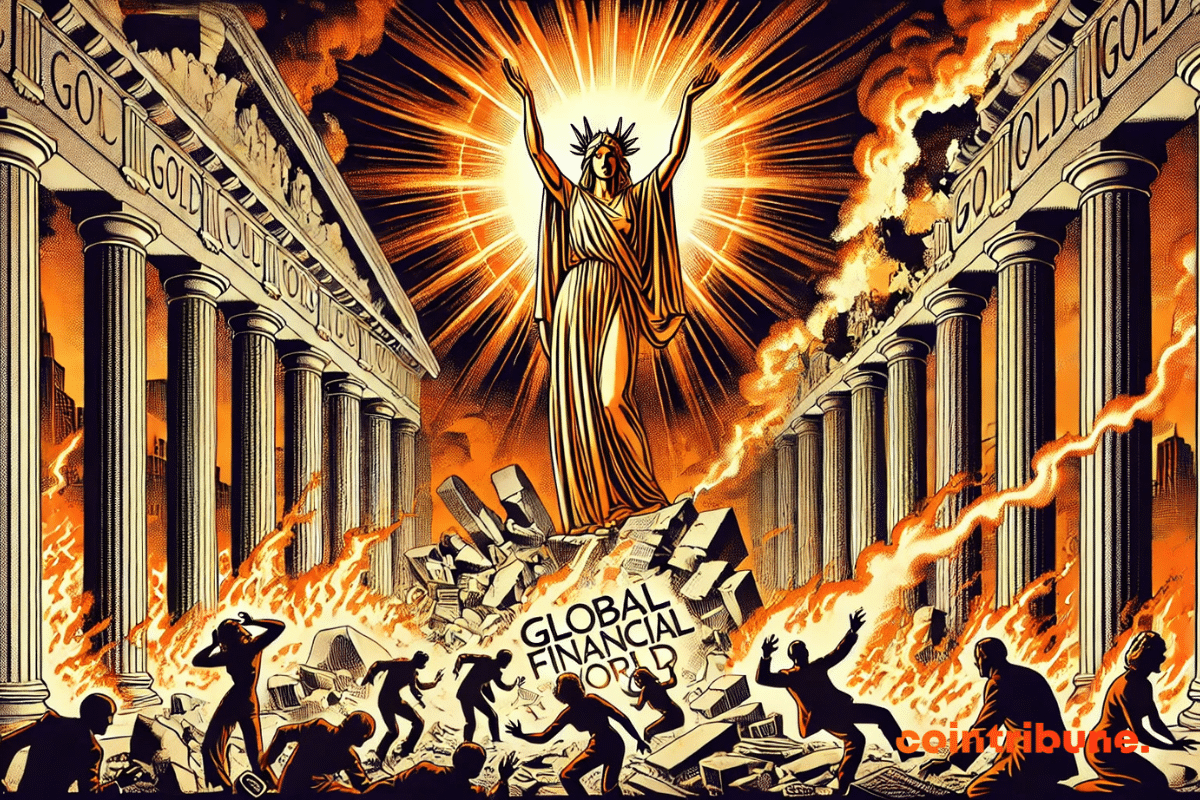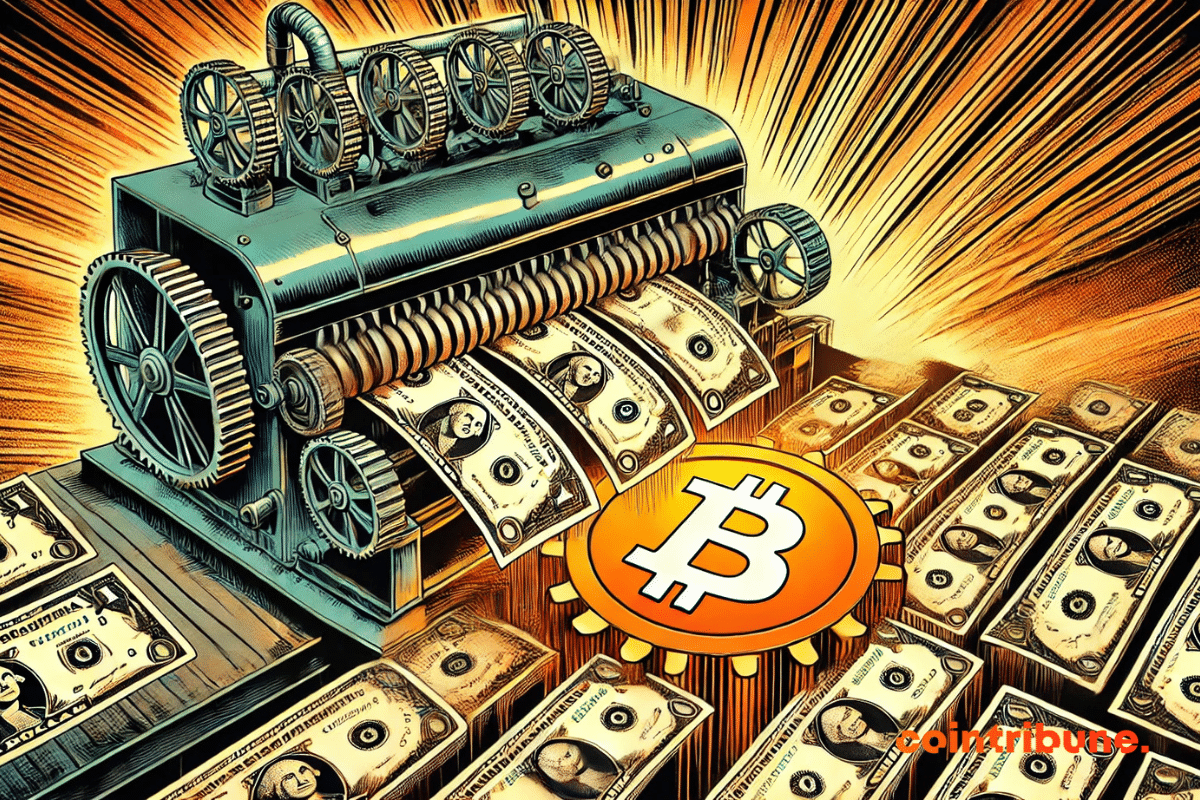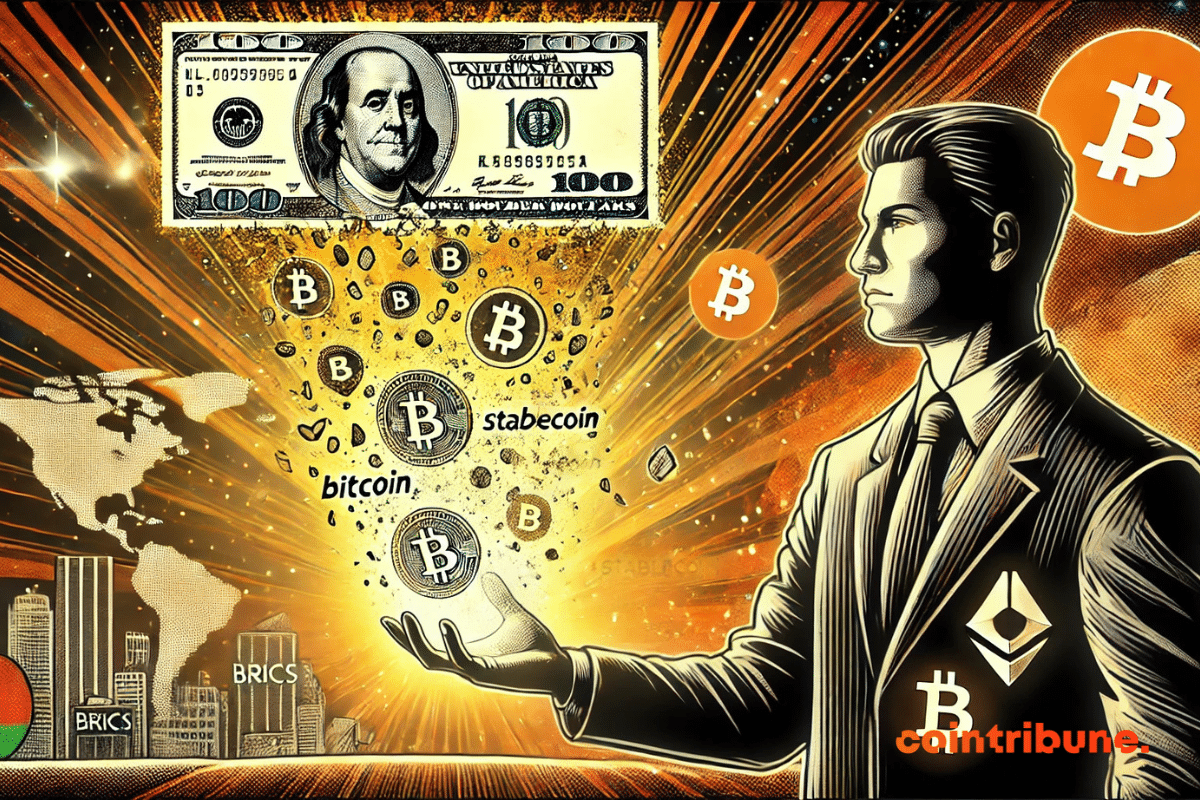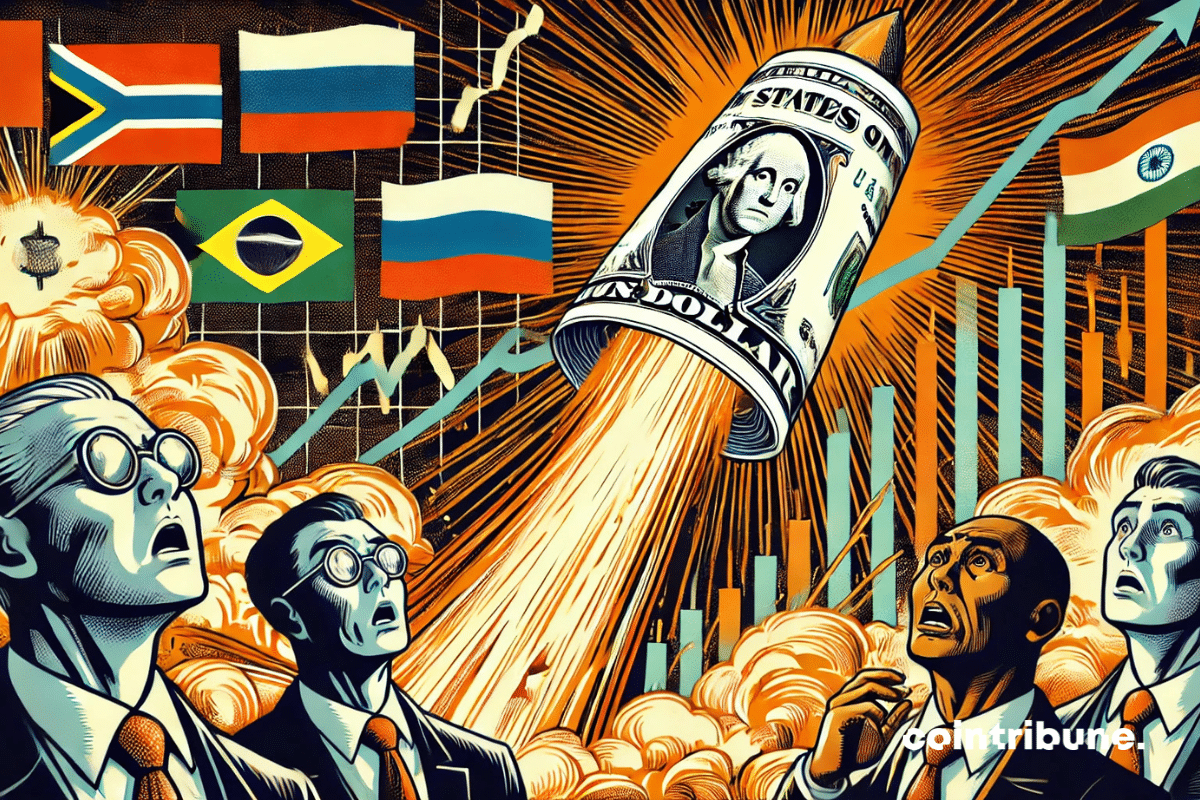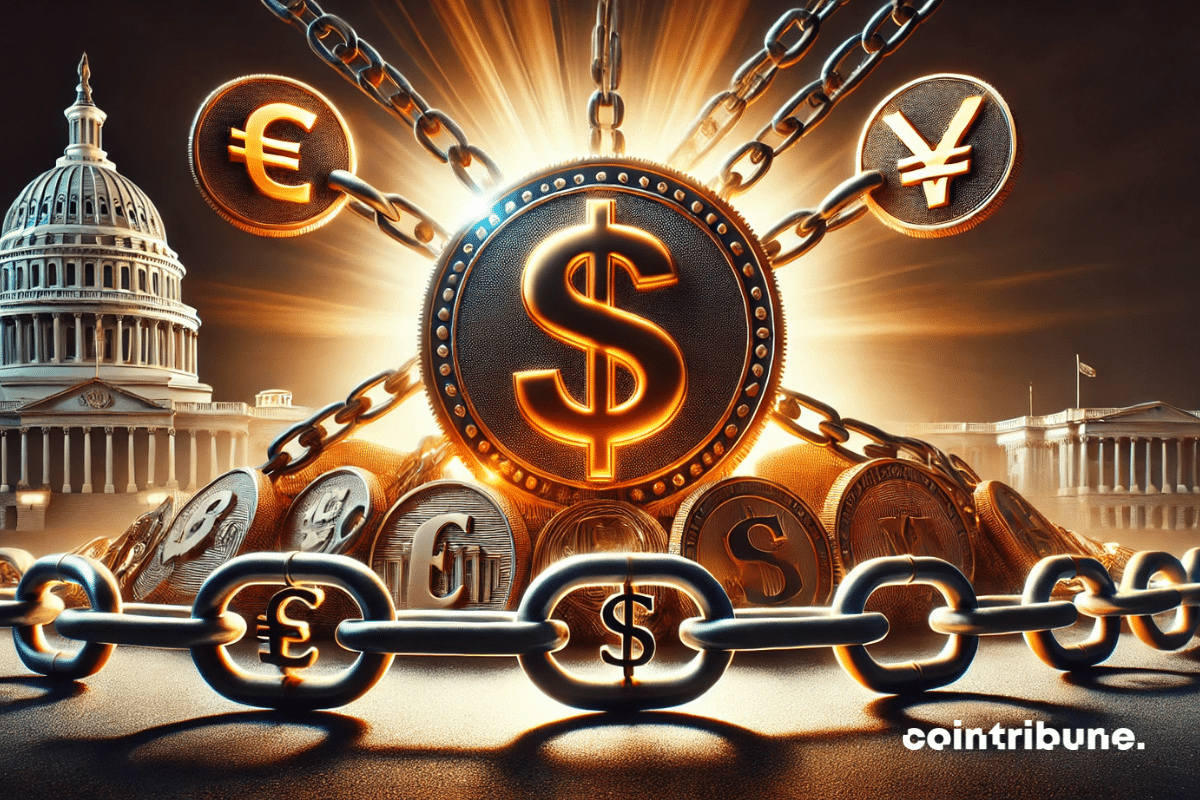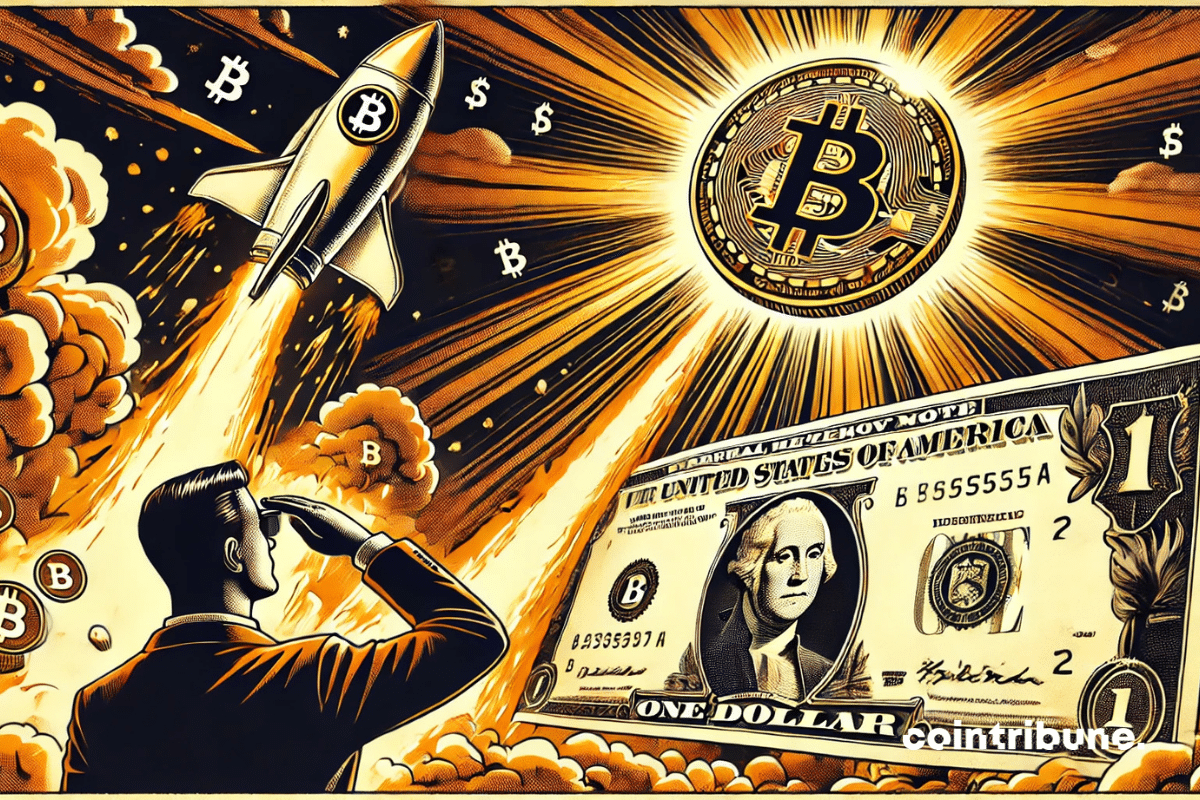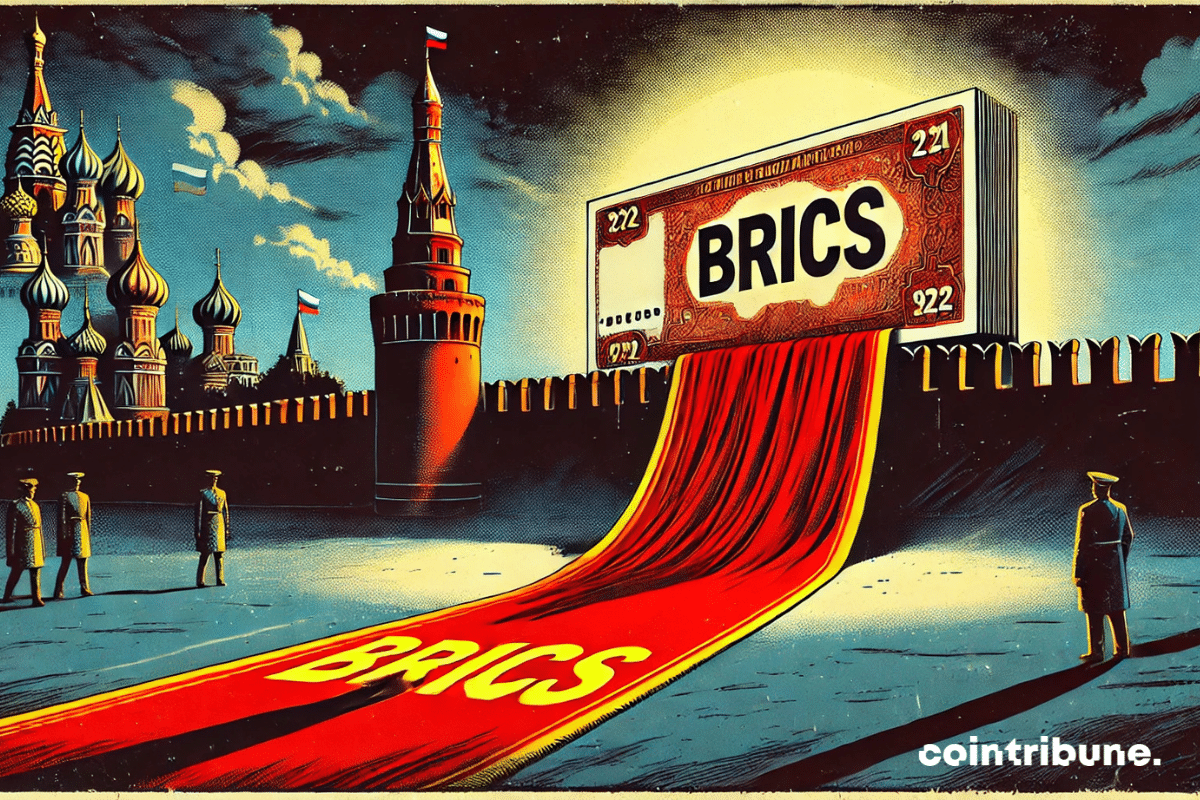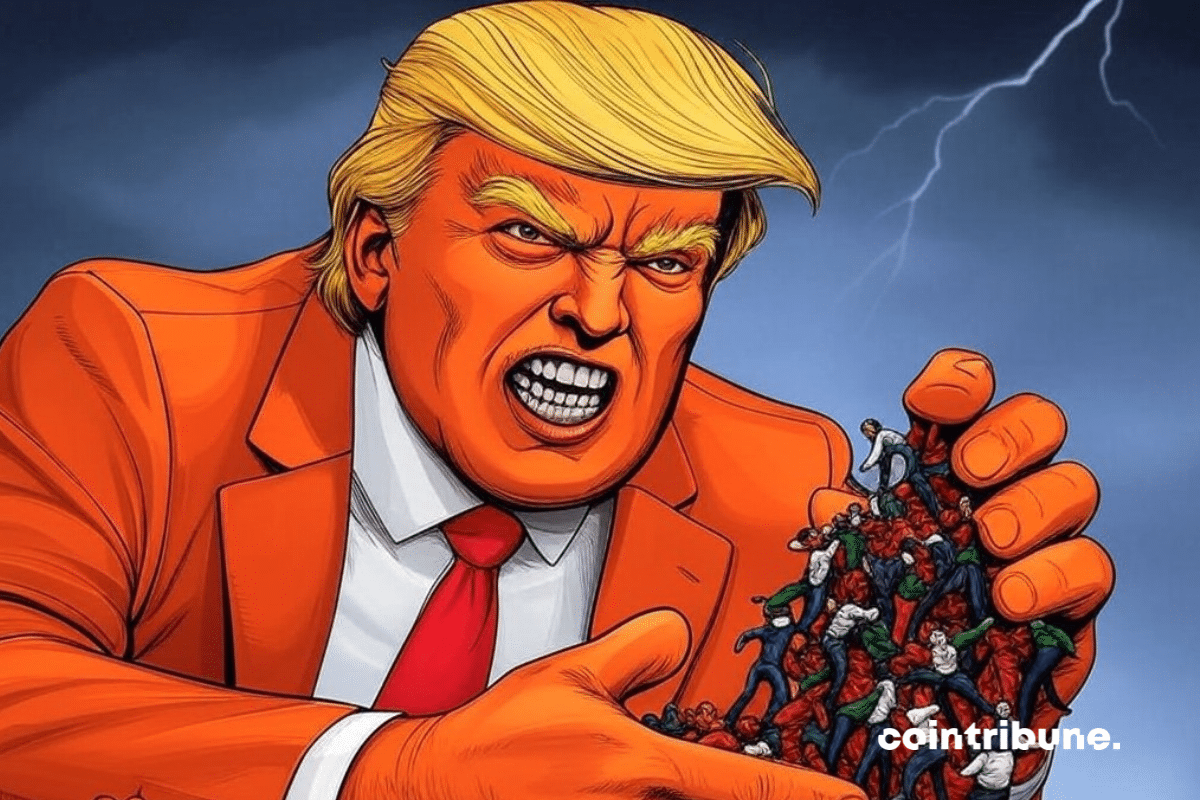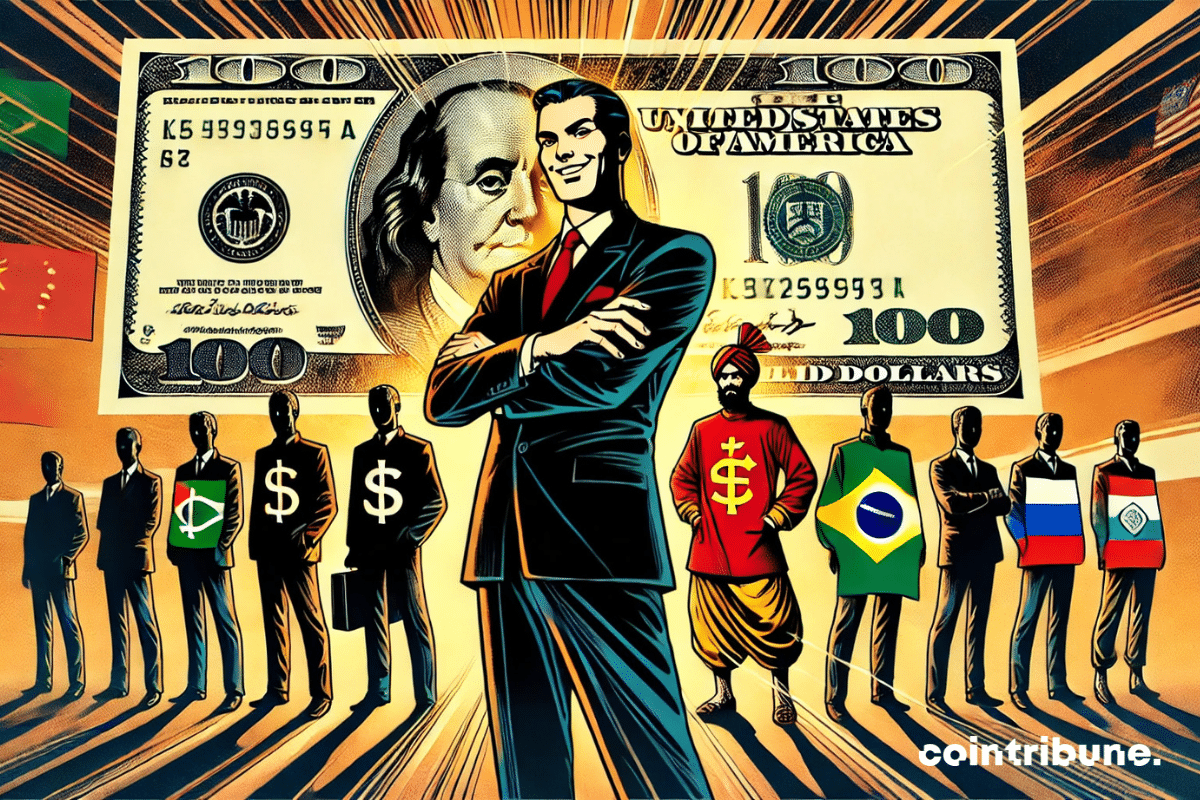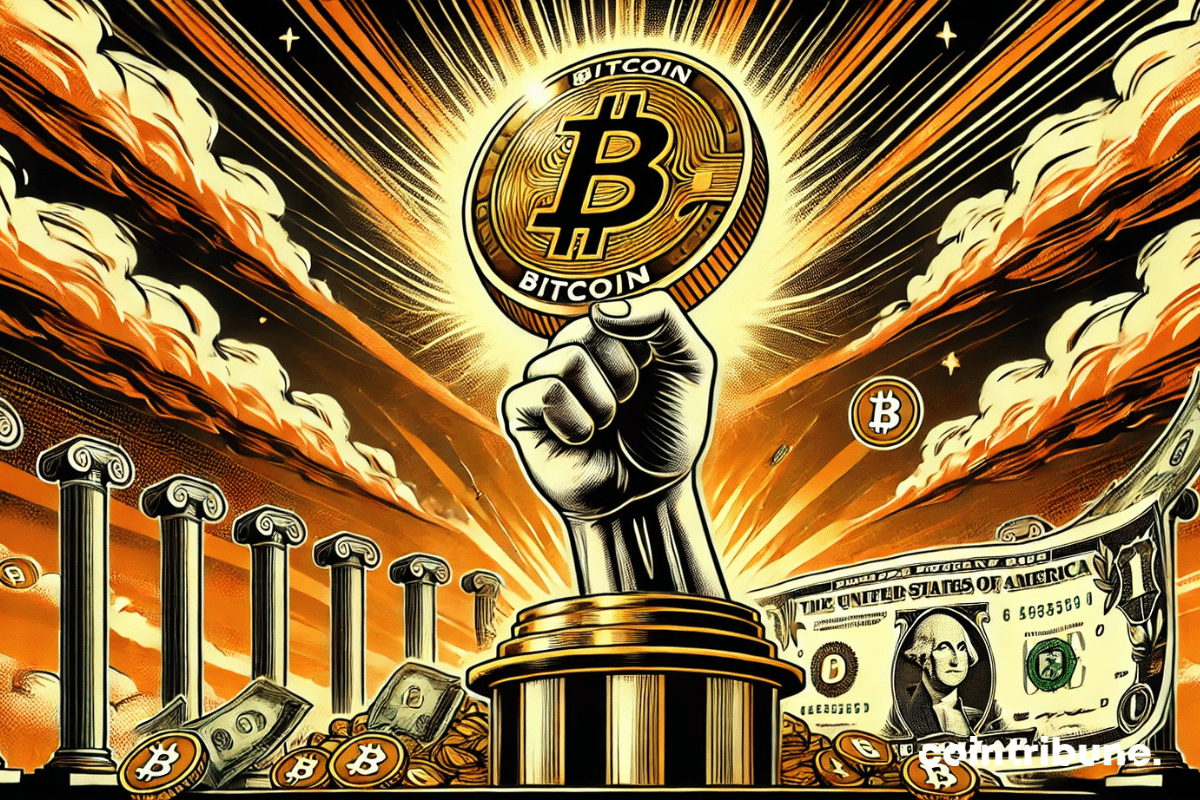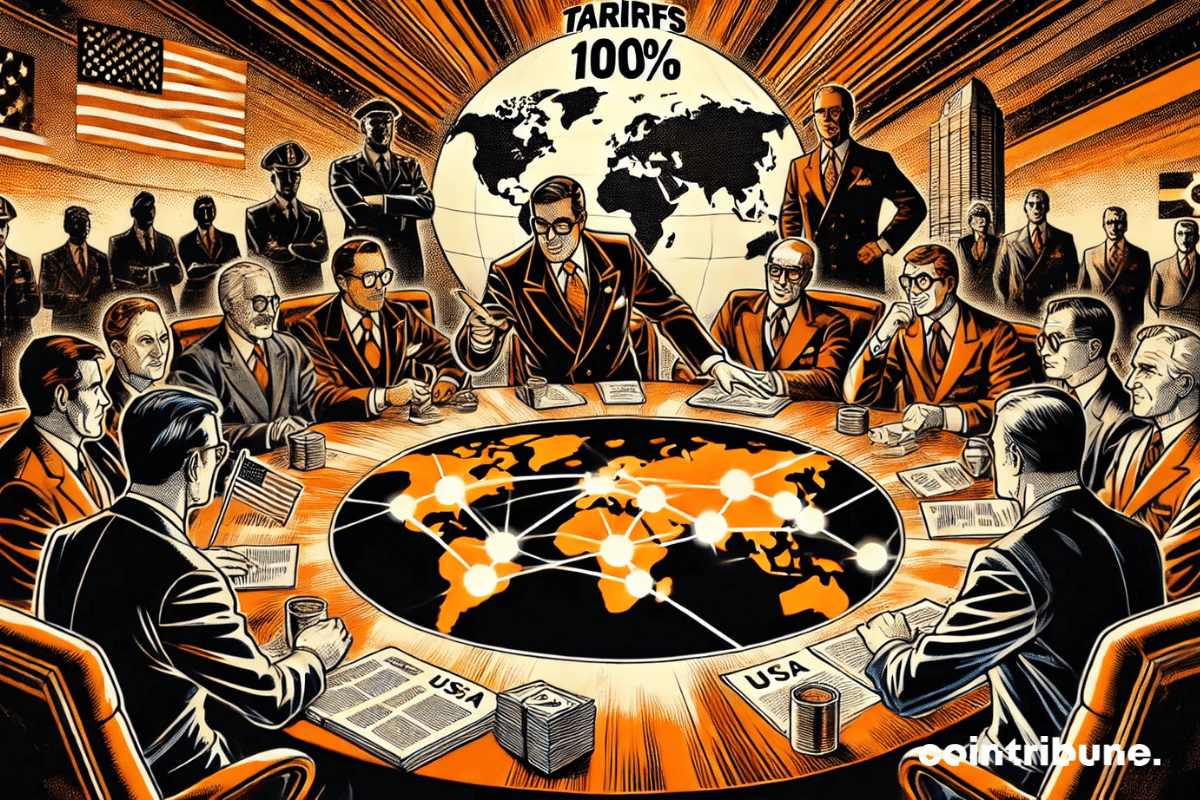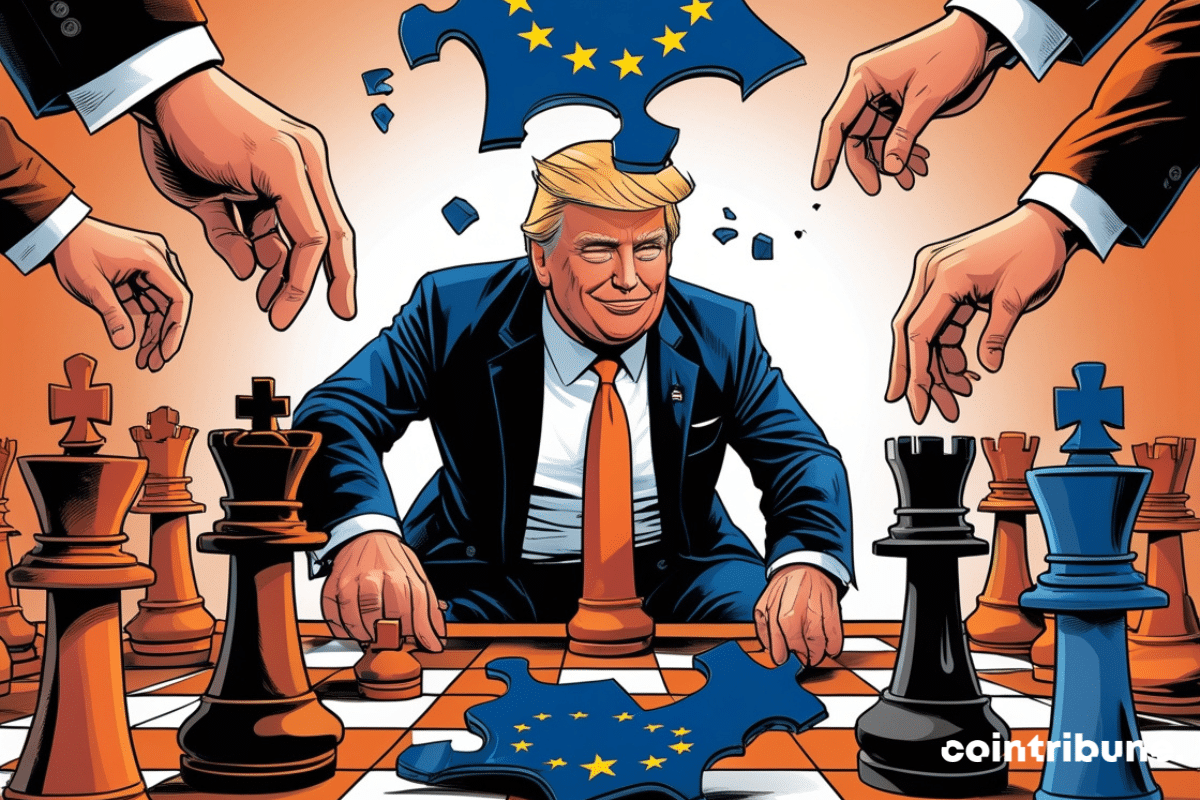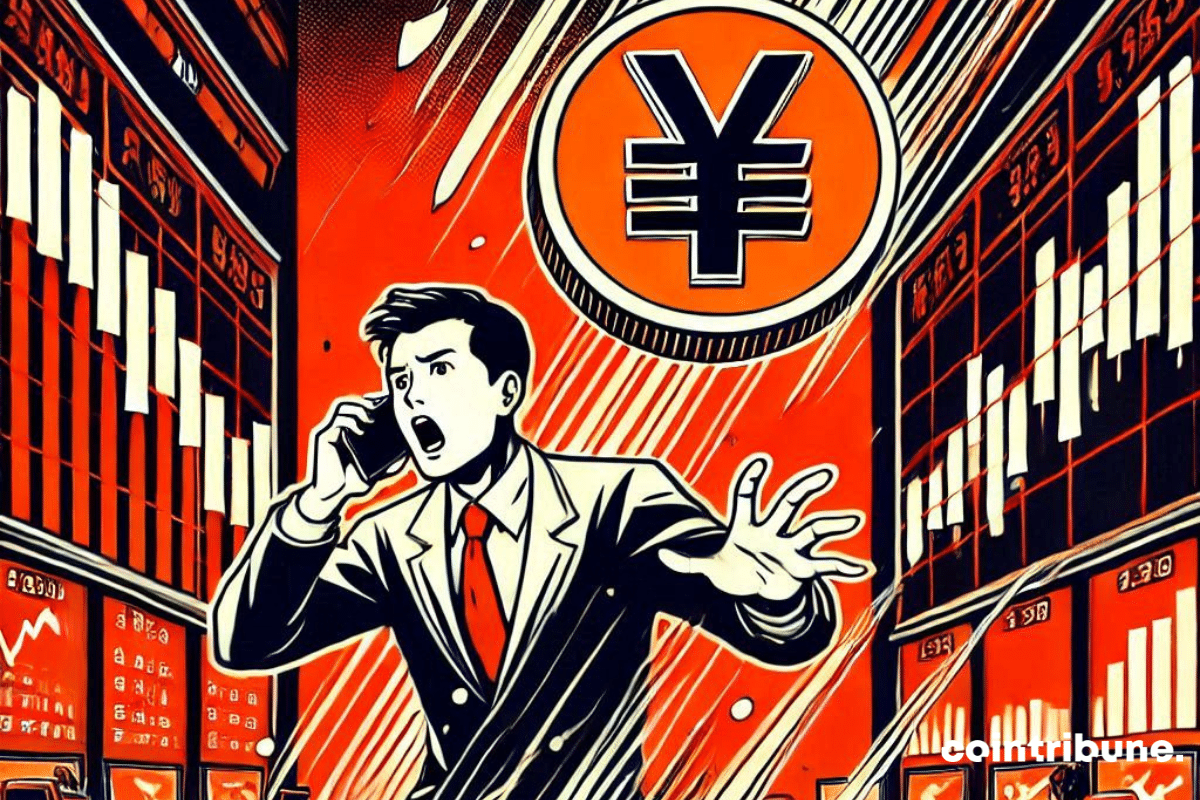Gold is no longer just a safe haven. It has become an instrument of economic power. In 2024, the BRICS have massively accumulated the precious metal, anticipating a tightening of American trade policies. This bet is proving to be worthwhile, as the new tariffs announced by Donald Trump triggered a historic surge in gold prices. As the trade war intensifies, the yellow metal is asserting itself as the monetary weapon of emerging powers against the dominance of the dollar.
Dollar
While the stock market stumbles, gold dances on the ashes of commercial promises. Trump stirs the embers, the Fed holds its breath in this theater of golden uncertainty.
The stimulus from monetary easing and the public deficit bodes very well for Bitcoin, which remains poised just below $100,000.
In his recent intervention, Subrahmanyam Jaishankar sought to dispel any ambiguity about India's position regarding the dollar: "there is no policy on our part aimed at replacing the dollar. At the end of the day, the dollar as a reserve currency is a source of international economic stability."
In recent weeks, the US dollar index (DXY) has fallen significantly, but contrary to investors' expectations, Bitcoin is not showing the parabolic growth typically associated with this phenomenon. This article analyzes the causes of this anomaly and its potential implications.
For decades, the US dollar has dominated international trade and has established itself as an essential global reserve. However, this absolute reign is now challenged by the BRICS bloc. As a result, geopolitical tensions and the rise of cryptocurrencies are pushing several countries to seek alternatives to the greenback. Bitcoin and stablecoins are emerging as instruments capable of circumventing the supremacy of the dollar, but paradoxically, they could also reinforce its influence.
The global economic order is trembling under the impact of protectionist decisions from the United States. While the BRICS aim to reduce their dependence on the dollar, a major upheaval could be on the horizon. The resurgence of American tariffs could fuel a rise in the greenback, threatening to weaken emerging economies and hinder their efforts for dollarization. This potential rise of the dollar, far from being trivial, could mark a turning point for global monetary balance.
Bitcoin, often seen as a safe haven against the failures of traditional currencies, is experiencing a striking paradox. While the US dollar is eroding at an unprecedented rate over the last 12 years, the crypto king stumbles. How can this disconnect be explained? Behind this contradiction lie obscure financial mechanisms, neglected indicators, and a silent standoff with central banks. Jamie Coutts, a seasoned analyst at Real Vision, sheds light on this high-stakes duel.
Scott Bessent, U.S. Treasury Secretary, announced yesterday at the White House crypto summit that Washington plans to use stablecoins to strengthen the dollar's position as the dominant reserve currency.
The global economy operates in cycles where fiat currencies play a crucial role in market dynamics. Indeed, the weakening of the US dollar, often seen as an indicator of macroeconomic adjustment, seems this time to open a window of opportunity for cryptocurrencies. According to Raoul Pal, analyst and CEO of Real Vision, the fall of the dollar could be the catalyst for a particularly bullish second quarter in 2025 for bitcoin and the entire crypto market. This optimism is based on historical data and well-established macroeconomic trends. But then, is this situation the signal of a sustainable rally or merely a temporary market reaction?
The debate about the future of fiat currencies and the rise of cryptocurrencies is intensifying. As the United States faces sustained inflation and record debt, some experts are questioning the viability of the traditional financial system. Robert Kiyosaki, entrepreneur and author of the bestseller "Rich Dad Poor Dad", has never hidden his skepticism towards the US dollar. He has once again reignited the debate, labeling the American currency as a "scam". Furthermore, he claims that Bitcoin represents the future. His statements, although extreme for some, resonate with many investors concerned about monetary instability and loss of purchasing power.
In an already geopolitically tense context marked by increasing economic tensions, Donald Trump has rekindled trade hostilities and is once again targeting the BRICS. The American president called the economic alliance "dead" and threatened to hit its members with a 100% tax on their exports to the United States if they continued to challenge the supremacy of the dollar. This statement immediately provoked a diplomatic reaction from China, which condemned a destructive protectionism and affirmed its commitment to strengthening cooperation among emerging economies.
The dominance of the US dollar in international trade is being challenged more than ever. A powerful bloc, the BRICS, is actively seeking to free itself from this by developing an alternative currency. In response to this offensive, Donald Trump, true to his style, does not intend to remain a spectator. The American president is wielding the threat of massive economic sanctions to deter any attempt to undermine the hegemony of the greenback. But can this strategy truly reverse the trend, or is it likely to accelerate the ongoing dynamics?
The global economy wavers between uncertainties and successive crises, and some analysts predict an even darker future. Among them is Robert Kiyosaki, entrepreneur and author of the bestseller "Rich Dad Poor Dad," who issues multiple warnings. He claims that a major economic collapse looms on the horizon, driven by a housing market crash, rampant inflation, and mass unemployment. More than just a prediction, his message is a call to action: those who do not prepare risk seeing their wealth collapse. But for Kiyosaki, solutions do exist, and among them, one currency seems truly capable of withstanding the financial chaos: Bitcoin.
Like a cowboy drawing his six-shooter, Trump unleashes reciprocal tariffs, awakening old economic ghosts and sowing panic for Bitcoin in the stock markets.
Rumors about a common BRICS currency frequently resurface, fueling speculation about a possible counterweight to the dollar. As several nations seek to reduce their dependence on the greenback, the prospect of a shared currency raises concerns in the United States. Donald Trump has threatened to impose sanctions on countries considering an alternative. However, the Kremlin has just defused the debate: no such project is under discussion. Instead, the bloc prioritizes joint investment platforms, leaving doubt about its true monetary strategy.
Donald Trump unveils his radical strategy to counter the monetary ambitions of the BRICS. In response to their proposal for a common currency, he threatens to impose 100% tariffs against any country that adopts it. This tough approach masks secret negotiations that could reshape the global monetary order.
The status of the US dollar in the global economy once again causes tensions. While the BRICS seek to free themselves from its hegemony, Donald Trump brushed aside any possibility of dedollarization. "There is no chance that the BRICS will replace the US dollar in international trade or elsewhere," he stated. This declaration comes at a time when China, Russia, and their allies are intensifying their efforts to limit their dependence on the greenback, particularly through exchanges in local currencies and the establishment of alternative financial infrastructures. Behind this statement from the American president, one question arises: is the dollar really unassailable, or are we witnessing the beginnings of a new monetary order?
The return of Donald Trump to the White House in January 2025 marks a historic break in American politics. In less than a week, the president signed 78 decrees affecting various areas such as domestic policy and international aid.
Global economic uncertainties and growing distrust in fiat currencies are disrupting investors' choices. Robert Kiyosaki, author of the famous Rich Dad Poor Dad, warns of the fragility of the US dollar, weakened by rampant inflation and deemed irresponsible monetary policies. According to him, bitcoin, gold, and silver are emerging as reliable safe havens in this crisis context. Through two economic principles, Gresham's law and Metcalfe's law, Kiyosaki provides insights into the growing role of bitcoin as a credible alternative and a tool for preserving value against the depreciation of traditional currencies.
Economic tensions between major powers are reaching a new level. The President of the United States, Donald Trump, has issued a direct threat to the member countries of the BRICS alliance, which are seeking to reduce their dependence on the U.S. dollar. In response to these de-dollarization initiatives, he announced 100% tariffs on their exports to the United States. This stance, accompanied by the establishment of a new agency to collect these customs duties, reflects a clear intent to defend the supremacy of the dollar and to counter any challenges to American economic hegemony. As the BRICS explore alternative payment systems, this statement could redefine the power dynamics on the global geopolitical and commercial stage.
Bayrou, an anxious prophet, portrays a Europe that watches a conquering dollar and a martial Trump, crushing our dreams of independence. The time for denial is over: it's time for a resurgence.
The BRICS project to create a common currency is generating growing interest among economists and analysts, as it could redefine global financial balances. For decades, the US dollar has dominated as the main reserve currency, giving the United States substantial economic and geopolitical power. During their summit in 2024 in Kazan, Russia, the leaders of the BRICS intensified their discussions on establishing an alternative called "Unit," designed to facilitate exchanges within the bloc. This project fits into a broader strategy aimed at reducing their dependence on the dollar, in the context of increasing geopolitical tensions and economic sanctions. At a time when many countries are seeking to diversify their reserves and bypass the constraints imposed by the current monetary system, can this initiative truly shake the dollar's supremacy?
The global economic landscape, long dominated by Western powers and supported by the preeminence of the dollar, seems on the brink of change. In the face of a financial system centralized around the United States and Europe, many nations are expressing a growing desire to turn to alternatives. This trend is accelerating with the recent announcement: more than twenty countries from several continents have officially submitted their candidacy to join BRICS in 2025. If this project comes to fruition, the expansion of the formed bloc could enhance its economic weight but also redefine the balance of power on a global scale.
This week, the cryptocurrency market is marked by the strength of the US dollar, reaching its highest level since the bear market of 2022. This situation creates challenges for Bitcoin (BTC) traders, who must navigate an environment of increased volatility as the US presidential inauguration approaches.
For several years, the BRICS have been seeking to reduce their dependence on the US dollar by developing a monetary alternative. However, at the beginning of 2025, the reality of the foreign exchange market is slipping away from them. The dollar is asserting itself more than ever and reaching new heights while the currencies of the bloc are collapsing. The Indian rupee has plummeted to a historic low of 85.93, the Chinese yuan is weakening, and other local currencies are struggling to hold on. Despite the BRICS' efforts to counter the hegemony of the greenback, the current dynamics expose the limits of their dedollarization strategy and raise the question of the viability of a credible alternative.
The yuan stumbles, the Middle Kingdom sways. The shadow of Trump, armed with taxes, looms and revives old economic demons.
The hashprice is a very important metric for crypto miners. It is particularly useful when it comes to determining the profitability of their operations. Therefore, if you are interested in Bitcoin (BTC) mining, or if you are simply a cryptocurrency enthusiast, you will probably want to learn more about it. This article explains in detail what hash price is and why it is so relevant in the crypto industry.
Bitcoin is Donald Trump's plan B if he fails to persuade the BRICS to stop their rebellion against the dollar.
The US dollar is establishing itself as the leading currency of 2024, dominating the foreign exchange market without competition. While many global economies face challenges such as rapid inflation and geopolitical uncertainties, the greenback is showing its best performance in nearly a decade. This remarkable progress is based on several solid pillars: a robust US economy, attractive bond yields, and a monetary policy skillfully orchestrated by the Federal Reserve. Additionally, there is a global context characterized by the weakening of competing currencies, such as the yen and the euro, which are unable to compete with the supremacy of the dollar. This rise reflects the resilience of the United States but also highlights the economic fractures shaking the rest of the world.
